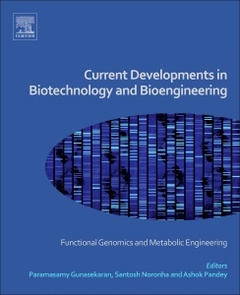Current Developments in Biotechnology and Bioengineering Functional Genomics and Metabolic Engineering
Coordonnateurs : Gunasekaran P, Noronha Santosh, Pandey Ashok

Current Developments in Biotechnology and Bioengineering: Functional Genomics and Metabolic Engineering provides extensive coverage of new developments, state-of-the-art technologies, and potential future trends in the field, compiling the latest ideas from across the entire arena of biotechnology and bioengineering.
This volume provides data-based scientific knowledge and state-of-art information on functional genomics and metabolic engineering. It covers the core subjects of functional genomics, such as epigenomics, metagenomics, genomics of extremophiles, genomics studies in nutrient transport, genomics of miRNA, and genomics of pathogenesis.
An overview of metabolic engineering theories and approaches is supported with specific important examples of secondary metabolites, including Streptomyces, pentose utilization in E. coli, bacterial ethanol fermentation, yeast mediated benzaldehyde biotransformation, carotenoid production, acetic acid production by E. coli,and NADH regeneration.
Section 1: Functional Genomics1. Functional epigenomics 2. Functional Metagenomics3. Functional genomics of extremophiles4. Functional genomics studies in nutrient transport5. Functional genomics of miRNA6. Functional genomics of pathogenesis
Section 2: Metabolic Engineering7. Overview of metabolic engineering theories and approaches8. Polyketide synthesis 9. Secondary metabolites from Streptomyces 10. Pentose utilization in E. coli 11. Bacterial ethanol fermentation 12. Yeast mediated benzaldehyde biotransformation 13. Carotenoid production14. Acetic acid production by E. coli 15. NADH regeneration
Prof. P. Gunasekaran is a Senior Professor of Microbiology in India. He has 33 years of teaching and research experience in Microbiology, Biotechnology and Genomics. He obtained his Bachelor’s Degree in Chemistry (1974) and Master’s Degree in Biology (1976) from Madurai Kamaraj University, Madurai. Subsequently, he obtained his Doctorate Degree in Microbiology (1980) from Haryana Agricultural University, Hisar. He started his career as a Lecturer cum Curator in Microbiology at Punjab University, Chandigarh in 1980 and became a Faculty of Madurai Kamaraj University in 1981. Presently, he is serving as the Vice-Chancellor of Thiruvalluvar University, Vellore.
Prof. P. Gunasekaran has made significant contributions in Industrial Microbiology especially on ethanol fermentation technology and microbial enzyme technology. His research has been focused mainly on Zymomonas mobilis, an ethanol producing bacterium. In addition to the research on Z. mobilis, he has made significant contributions in process optimization and production of various industrial enzymes from different bacterial and fungal sources. He visited several countries worldwide including USA, UK, France, Mexico, Japan, South Korea and Hungary to conduct colloborative research programs.
He has introduced a new postgraduate course, M.Sc. Genomics at MKU, for the first time in India, Under the UGC-supported Centre for Excellence in Genomic Sciences (CEGS) programme. He elevated this course to a new hight as Integrated M.Sc.–Ph.D. course in Genomics, for the first time in India with the support of DBT-supported Interdisciplinary Programme of Life Sciences (IPLS). With the support from the UGC, New Delhi he has established Networking Research Centre in Biological Sciences (NRCBS) with State of the Art research laboratory facility which cater the need of the researchers from any time from any where in the country.
He has guided 36 Ph.D students in his career and 4 students are waiting for fina
- Provides state-of-the-art information and applications of functional genomics and metabolic engineering as applied to biotechnology
- Supports the education and understanding of biotechnology education and R&D
- Demonstrates new means of enabling cells to produce valuable proteins, polypeptides, and primary and secondary metabolites
Date de parution : 09-2016
Ouvrage de 316 p.
19x23.3 cm
Thèmes de Current Developments in Biotechnology and Bioengineering :
Mots-clés :
(R)-PAC; 454 pyrosequencing; Active pharmaceutical intermediates; Activity screening; Biocatalysis; Cancer epigenetics; Cancer; Carboligase; Carbon catabolite repression; Chromatin remodeling; Circulating miRNAs; Cofactor engineering; Cofactor regeneration; Comparative genomics; Constraint-based analysis; Constraint-based modeling; Co-utilization; DFI; DNA methylation; Ephedrine alkaloids; Epigenetics; Extremophiles; Flavoproteins; Flux balance analysis; Functional epigenomics; Functional genomi



